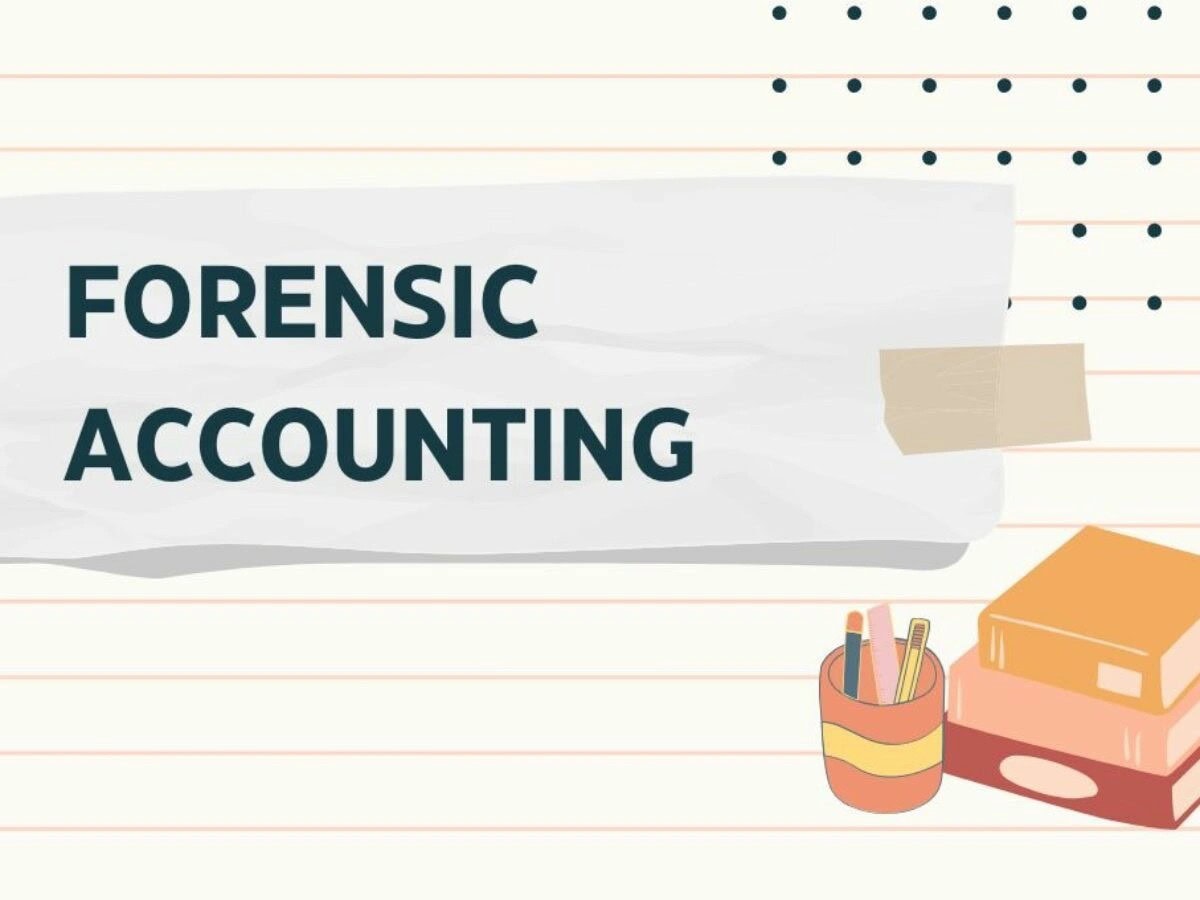A forensic accountant charges $300-$500 per hour for divorce cases. The total cost is a big deal as it means that $3,000 depending on how complex the case is . These professionals are a great way to get clarity when questions arise about finances during a marriage breakup.
You might need a forensic accountant if you think your spouse is hiding money or using shady financial tactics during divorce . The investment ranges from $3,000 to $10,000 for typical cases . This cost often pays itself back by finding hidden assets or giving accurate business values. Cases with major assets in big cities start around $30,000 .
This piece covers seven key warning signs that tell you it’s time to hire a forensic accountant. You’ll learn what these financial detectives look for and how they help reach fair settlements. We’ll also break down the costs and share tips to find the right professional who will protect your money during this tough transition.
This article is informational and written on behalf of Joey Friedman, CPA, ABV, M.Acc, MIB—President & CEO of Joey Friedman CPA PA. With credentials recognized by the AICPA and years of hands-on forensic accounting experience in Florida divorce cases, Joey brings firsthand expertise to every engagement. If you are navigating a divorce and suspect financial irregularities, understanding when to hire a forensic accountant divorce specialist can make the difference between a fair settlement and a costly oversight.
7 divorce red flags that mean you need a forensic accountant
Image Source: Smedley Law Group
Financial deception during divorce happens more often than you might think. admit they or their ex-partners concealed financial details during their divorce proceedings About 36% of divorcees[1]. You can protect your financial future and get a fair settlement by spotting these warning signs early.
1. Your spouse controls all finances and hides information
A significant power imbalance exists when one spouse has complete control over financial matters. Watch out for red flags like restricted access to financial accounts or statements, secret transactions, or refusal to explain questionable money movements [2]. Your spouse might have always managed money matters but has become more secretive about finances lately. This behavior typically points to hidden information [3]. The control pattern often includes making you account for every expense while they refuse to do the same [1].
2. There are sudden changes in business income or losses
“” happens when a spouse’s income changes dramatically right before or during divorce proceedings Sudden Income Deficit Syndrome[4]. Business owners can manipulate records through underreported income, fake employees, inflated expenses, or delayed compensation until after divorce [5]. Business performance that sharply differs from industry standards or past records should raise concerns, especially when it doesn’t match current spending habits [4].
3. You suspect hidden bank accounts or offshore assets
High-asset divorces often involve concealed accounts. Be alert to signs like unknown bank accounts or credit cards, missing financial papers, or unusual account transfers [3]. Offshore assets create special challenges because they fall under strict privacy laws in other countries [6]. A forensic accountant can track disguised assets both locally and overseas by examining financial records thoroughly [7].
4. Reported income doesn’t match your lifestyle
The math should add up. A lifestyle that doesn’t match reported income raises serious red flags [8]. Your spouse might claim modest earnings yet maintain expensive habits like luxury purchases, private school tuition, or high-end vehicles [3]. This gap usually indicates undisclosed income sources or hidden assets that should be part of your divorce settlement [9].
5. There are large unexplained withdrawals or transfers
Money might be getting diverted if you notice unusual financial activity like big cash withdrawals, suspicious transfers, or “loans” to family members [9]. Multiple small transfers between accounts often try to hide the paper trail [3]. These transactions usually happen just before filing for divorce as people try to reduce visible marital assets [10].
6. You’re unsure about the value of a shared business
Divorce creates unique challenges for business valuation, especially with goodwill disputes and ownership complications [11]. Business owners might deflate profits or underreport revenue by changing invoices, paying employees off the books, or inflating expenses [9]. Fair settlements depend on accurate valuation since courts rarely split business ownership equally after divorce [12].
7. You suspect marital waste or dissipation of assets
Wasteful dissipation means intentionally destroying, depleting, or wasting marital assets as the marriage breaks down [13]. Examples include excessive gambling, funding affairs, making unnecessary purchases, or selling assets below market value [13]. Courts can factor this misconduct into asset division and might give the innocent spouse a bigger share as compensation [14].
What a forensic accountant investigates in these situations
Forensic accountants work as financial detectives during divorce cases. These certified professionals blend their accounting expertise with detective work to uncover financial details that courts and uninformed spouses might miss.
Asset tracing and financial record analysis
These experts break down financial documents to track money movements. They look through bank statements, credit card records, loan applications, and tax returns to spot red flags that might point to . A detailed look at bank statements helps them identify suspicious patterns like large cash withdrawals, unusual wire transfers, or checks written to cash—all signs that someone might be hiding assets.hidden funds
When they suspect hidden accounts exist, forensic accountants use advanced tracking methods to follow money through different banks. They search for unexplained money moves to unknown accounts, ATM transactions in strange locations, and gaps between what people earn and spend. They’re skilled at catching spouses who try to hide assets by temporarily giving them to friends or family members until the divorce wraps up.
and income verification Business valuation
Business valuations in divorce cases require special approaches from forensic accountants. They typically use:
- Market Approach: Looking at sales prices of similar businesses
- Income Approach: Calculating value from expected future earnings
- Asset Approach: Adding up asset values and subtracting debts
These experts do more than simple valuations. They catch business owners who try to manipulate their books. Red flags include unreported income, fake expenses, non-existent employees, or delayed payments. They can tell the difference between real business costs and personal expenses that someone runs through the company to make it look less valuable.
Identifying marital vs. separate property
Figuring out which assets belong to the marriage versus one person is crucial in divorce cases. Forensic accountants use several methods to track where assets came from:
- Direct Tracing: Following individual property from start to present
- Exhaustion Method: Assuming couples spend shared money first
- Minimum Sum Balance Method: Finding separate deposits that haven’t been touched
This work becomes especially important when separate assets (like inheritances or pre-marriage money) mix with shared marital assets. These experts document where money came from, when it moved, and how it was used to prove who owns what.
Uncovering fraud or financial misconduct
Forensic accountants know the signs of financial deception. They spot suspicious withdrawals, sudden business income changes, and odd spending habits. They often uncover schemes like:
- Setting up fake companies to hide money
- Sending funds to offshore accounts
- Paying extra on debts to reduce available cash
- Buying cryptocurrency to hide assets
- Making business assets look less valuable
Their detailed analysis helps courts make fair decisions about property division, alimony, and child support. Instead of just taking financial statements at face value, these experts verify everything through solid evidence and expert review.
How forensic accounting supports fair outcomes
Forensic accountants do more than find hidden assets. They play a vital role in making sure divorce proceedings end fairly for both parties. Their expert analysis creates the foundations for equitable financial settlements that hold up under legal review.
Ensuring equitable distribution of assets
Courts need forensic accountants to properly implement equitable distribution principles. Their objective analysis helps courts divide marital property fairly based on each spouse’s financial situation and contributions. Rather than a simple 50-50 split, equitable distribution aims for fairness[15].
These accountants trace where assets came from to properly label them as marital or separate property. This classification matters because courts look at several factors. Marriage duration, each spouse’s financial circumstances, and contributions to the family unit all come into play [16]. Their detailed analysis stops one spouse from getting an unfair edge through financial manipulation [17].
Accurate calculation of alimony and child support
Support cases face a big hurdle – figuring out true income. This becomes even harder with self-employed people or business owners who control their income reporting [18]. Forensic accountants tackle this by looking at years of financial records to find the real earning capacity.
Their testimony can substantially change support amounts in high-profile cases. To name just one example, in Kevin Costner’s divorce, forensic accountants from both sides helped reduce child support from the requested $175,000 to $63,000 monthly[19]. They break down legitimate expenses versus optional spending to give courts solid data for fair support calculations.
Providing clarity in complex financial cases
These specialists turn complicated financial information into terms everyone can understand. They act as financial translators who explain complex money matters to judges, attorneys, and spouses who lack financial backgrounds [20].
Professional forensic accountants say their main goal is complete financial transparency so courts can make fair decisions [18]. This clarity becomes especially valuable with business involvement. They provide independent valuations that look at past performance, market conditions, and future earning potential [18].
Helping courts make informed decisions
Forensic accountants bring professional credibility when they testify as expert witnesses. This helps judges grasp the true financial picture [18]. Their testimony often provides the key evidence needed for fair settlements [20].
Courts rely on these experts to check if reported income matches spending patterns [18]. This lifestyle analysis often spots differences courts might miss on their own. The result ensures financial arrangements match real circumstances instead of manipulated reports.
Understanding the cost and payment responsibilities
A forensic accountant can be a smart investment, but you need to plan your finances carefully. These professionals might seem expensive at first, but they often help clients save money by finding hidden assets that would otherwise stay buried.
Average cost of hiring a forensic accountant for divorce
Forensic accounting services usually cost $300 to $500 per hour [21][2][3]. Basic cases start at $3,000 [21], but costs can rise quickly when complex assets are involved [3]. Cases with business interests or lots of paperwork might cost between $5,000 and $25,000 [3]. Major cities like Los Angeles see even higher rates, with services starting around $30,000 [22].
Your final bill depends on several key factors:
- How complex your case is financially
- How many documents need review
- Whether you need special expertise (business valuation, fraud investigation)
- Where you live and local market rates
Flat fee vs. hourly billing
Forensic accountants typically charge by the hour [23][10]. They track their time spent reviewing documents, analyzing data, and preparing testimony. This way, clients only pay for actual work on their case [10].
Some accountants offer flat-fee packages for specific services [23]. These packages work well for focused financial reviews based on estimated workload and complexity. Whatever the payment structure, most professionals want a signed agreement and upfront retainer before they start work [23].
Who pays for a forensic accountant in a divorce
The spouse who asks for forensic accounting services usually pays the bill [21][24]. This makes sense since they’re the one hoping to benefit from finding hidden assets or financial issues [25].
Payment arrangements can vary based on your situation:
- One spouse covers all costs
- Both spouses split the bill (common in friendly divorces)
- The court decides who pays what
How courts decide cost allocation
Courts look at each spouse’s financial situation when deciding who pays for forensic accounting [3]. When one spouse has much more money than the other, judges might order them to pay all or most of the costs [3][26].
Judges also look at whether these services are needed for a fair settlement. If the investigation finds hidden assets or financial wrongdoing, the court might order the spouse at fault to pay back the accounting costs as part of the final settlement [25].
Tips for hiring the right forensic accountant
Choosing the right forensic accountant plays a vital role in your divorce case’s success. Their experience and qualifications directly affect the quality of financial analysis and expert testimony they provide.
Check qualifications and experience
A Certified Public Accountant (CPA) certification stands as the basic requirement for a forensic accountant. You should also look for specialized credentials like Certified Fraud Examiner (CFE) or Certified in Financial Forensics (CFF) that show deeper expertise. We focused on finding professionals with specific experience in tracing and characterizing marital property.
Look for divorce-specific expertise
Many forensic accountants lack family law specialization, and few have stepped into a courtroom. You need someone who knows relevant state laws and can be a credible, authoritative expert witness. Their track record with complex divorce cases offers great insights for handling financial complexities.
Ensure clear communication with your legal team
Most divorce lawyers have networks of trusted forensic accountants they recommend. Your chosen accountant should explain complex financial concepts clearly and work together smoothly with your attorney. Sometimes lawyers bring in different accountants – one handles business valuation while another serves as a consultant under attorney-client privilege.
Ask for a cost estimate upfront
Note that you should discuss fees and methods before starting. Think about hiring in stages to see if more investigation makes financial sense. A complete cost-benefit review helps you know if potential findings are worth the investment.
Conclusion
Financial deception creates major problems for couples going through divorce. You can save money and avoid heartache by catching suspicious activities early. A forensic accountant’s help might get pricey upfront with . But these experts often find hidden assets worth far more than their fees.fees ranging from $300 to $500 hourly
Several warning signs point to possible financial misconduct. Watch out for partners who keep financial secrets, show sudden changes in income, live beyond their means, make unexplained money moves, or seem to be wasting assets. You need to act fast when you spot these red flags before assets vanish for good.
Think of forensic accountants as financial detectives. They track money trails through complex paperwork with great attention to detail. Their work helps courts split marital assets fairly and set the right amounts for alimony and child support. On top of that, they break down complicated money matters into clear terms that courts can easily understand.
You need to pick the right expert by looking at their credentials, track record, and ability to communicate. and divorce case experience usually do the best work. A good first meeting helps you see if the potential findings are worth the investment.Certified Public Accountants with specialized forensic credentials
The price tag of a forensic accountant looks small next to what you might lose from hidden assets. Many people going through divorce find these experts essential to protect their financial future. The goal is simple – fairness and openness that gives both parties what they legally deserve after the marriage ends.
Key Takeaways
Recognizing financial red flags during divorce can protect your assets and ensure fair settlement outcomes. Florida residents can find additional self-help resources through the Florida Courts website. Here are the critical warning signs and actions to take:
- Watch for financial control patterns: Secretive behavior, restricted account access, and sudden income changes signal potential asset hiding worth investigating.
- Lifestyle-income mismatches reveal deception: When reported earnings can’t support observed spending habits, hidden income sources likely exist.
- Forensic accountants cost $300-500/hour but often pay for themselves: Their investigations frequently uncover hidden assets worth more than their fees.
- Seven red flags demand immediate action: Financial secrecy, business income changes, suspected hidden accounts, lifestyle inconsistencies, unexplained transfers, unclear business values, and asset waste.
- Professional expertise ensures fair outcomes: Certified forensic accountants provide objective analysis that courts rely on for equitable asset distribution and accurate support calculations.
The investment in forensic accounting services, typically $3,000-$10,000 for standard cases, becomes insignificant compared to the potential financial devastation of undiscovered hidden assets. Early detection of suspicious financial activity allows protective measures before assets disappear permanently.
FAQs
Q1. When should I consider hiring a forensic accountant for my divorce? Consider hiring a forensic accountant if you suspect financial deception, such as hidden assets, unexplained income changes, or lifestyle inconsistencies. They’re particularly valuable in complex cases involving businesses or significant assets.
Q2. What are some common red flags that indicate financial misconduct in a divorce? Key red flags include a spouse controlling all finances, sudden changes in business income, unexplained large withdrawals or transfers, lifestyle that doesn’t match reported income, and suspected hidden accounts or offshore assets.
Q3. How much does it typically cost to hire a forensic accountant for a divorce case? Forensic accountants usually charge between $300 and $500 per hour. Total costs for standard cases often exceed $3,000, while complex cases involving businesses or extensive assets can range from $5,000 to $25,000 or more.
Q4. What specific financial aspects does a forensic accountant investigate during a divorce? Forensic accountants conduct asset tracing, analyze financial records, perform business valuations, verify income, distinguish between marital and separate property, and investigate potential fraud or financial misconduct.
Q5. How do forensic accountants contribute to fair divorce settlements? Forensic accountants ensure equitable asset distribution by uncovering hidden funds, providing accurate business valuations, and calculating true income for support payments. Their expert analysis helps courts make informed decisions based on a complete financial picture.





